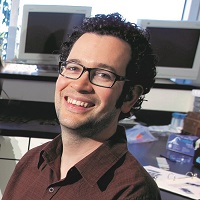
Behavioural neuroscientist wins New Researcher of the Year
In October Howland was awarded the New Researcher of the Year award for his work in behavioural neuroscience.
By Marg SheridanFor the College of Medicine’s Dr. John Howland, a return to the College of Medicine has been a research boon.
In October Howland was awarded the New Researcher of the Year award for his work in behavioural neuroscience.
Howland, who completed his Ph.D. in Psychology at the University of British Columbia, joined the U of S Psychology department in 2008 before moving to the Department of Physiology.
“My work is really more physiology and neuroscience, which fits into psychology,” explained Howland. “We’re most interested in behavioral measurements, and we’ve focused to this point on what effects acute stress has on behaviour and brain function.
“So things like learning, memory, your ability to plan and solve problems.”
His research also looks at how inflammation and infections during pregnancy affect the development of offspring, with a focus on psychiatric disorders like schizophrenia and, to a smaller degree, learning disabilities.
“I have friends who are affected by these types of disorders – they’re common enough that many people have those types of relationships,” said Howland. “But my knowledge of the neuroscience just got me more and more interested in how far we can use just biology and neuroscience to explain these types of conditions.”
His work has already led to grants from the Canadian Institutes of Health Research (CHIR), Brain Canada, and the National Sciences and Engineering Research Council of Canada (NSERC), as well as publication in respected journals such as the Nature Reviews Neuroscience.
And the fact that his coworkers were not only aware of the work that he was doing, but felt that he was doing something interesting and important to merit a nomination, was the main point of pride in winning the award.
“I think more than anything it gives me some confidence and realization that we are doing something that is being noticed.”
For more information on Dr. Howland's work you can visit his USask webpage.
